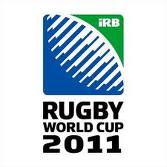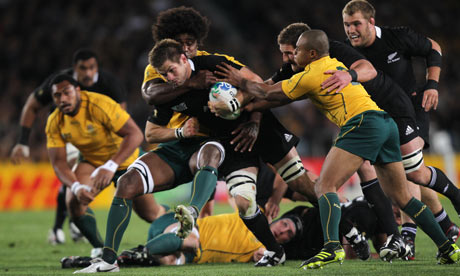From Barry Newcombe, Auckland
 Covering the 2011 Rugby World Cup in New Zealand has been a hard slog for journalists from Europe, and even harder for the British contingent, not only because of the time difference, because of unexpected demands of their news desks.
Covering the 2011 Rugby World Cup in New Zealand has been a hard slog for journalists from Europe, and even harder for the British contingent, not only because of the time difference, because of unexpected demands of their news desks.
England survived only as long as the quarter-finals, but along the way created additional news interest because of stories of drinking and dwarf throwing, and Zara Phillips’s arriving and finding new husband Mike Tindall the centre of attention because of off-field stories.
So the hacks found themselves covering the World Cup on two fronts, all against a background of a 12-hour time difference, with the demands that made on day-to-day living in a tournament which, even by the quarter finals, had lasted six weeks.
With Scotland already going out in the group stages, when England lost to France, some of the UK press teams reporting the tournament began to reduce, even with Wales one game away from the final. In this final week – Wales play Australia in the third place play-off on Friday with the final between France and New Zealand on Sunday, both games being played in Auckland – the focus of the coverage has tended to be on the sport itself, although with Martin Johnson’s team long ago home, England have still been under a degree of media scrutiny, because they will be hosts to the 2015 World Cup.
That it has been a demanding time is beyond question and Paul Morgan, the chairman of the Rugby Writers’ Club, editor (for now) of Rugby World magazine and one of the Mail on Sunday‘s team here, said: “The organisation has been superb,the attitude at the media centres has been 10 out of 10. It would have been impossible for them to do any more, they have set a standard.”
Morgan, and others, regretted that the World Cup organisers have charged for internet access at match venues. “We will never agree that access should be charged for,” he said. “It should be free to all media, to allow us to do our job. Internet access should be free for the media when they bring the tournament to England in 2015.
“It is true the wi-fi has worked well, but for the knockout stages the organisers were charging £25 a weekend. Go to Starbucks and MacDonalds, and you can use their wi-fi there free.” Given that Morgan is soon to take up a new job as communications director at Premiership Rugby, it will be interesting to see whether he will carrying these views over to the England World Cup organisers.

Morgan extended his praise of this year’s tournament to other organisations. “I would praise the New Zealand tourist board for showing us the country so well and they have been incredibly helpful.
“I expect there will be other factors to look at when the tournament is over and the rugby writers will help as much as we can with suggestions. It has been a tough mission with long days and nights and phone calls on a 24-hour basis.”
Wynne Gray, rugby correspondent of the New Zealand Herald for the past 23 years, has been a journalist for 35 years and is an SJA mermber. He says: “This is my sixth World Cup, they have worked at it and moved on, it should be like the Olympics, a smooth operation.
“We have had good viewing positions. By and large it has been a good tournament which we are portraying, but of course we are having to pay internet charges.
“All the visiting fans have shown New Zealand that there is a bit more to it than just myopically watching the All Blacks.”
SJA WORKING LUNCH: Baroness Grey-Thompson on the 2012 London Paralympics. Thu Nov 17: click here for booking details
- Who will you vote for as Britain’s Sportsman, Sportswoman and Team of the Year? See Ian Cole’s overview of the leading candidates by clicking here.
- Follow news of the SJA British Sports Award on Twitter with the hashtag #SJA2011
- Mo Farah’s historic claim on your votes By Randall Northam
- Mark Cavendish keeps his promise in his race of his life By Richard Williams
- England’s Ashes-winning cricket team are top of the world. By Ian Cole
- Laura Davies gets back on song with Solheim. By Patrick Kidd
- Alastair Cook’s tour helped drag England from the brink. By Ian Cole
- Chrissie Wellington is an Iron Lady who deserves your vote. By Steven Downes
- Nick Matthew, squash’s heir to Barrington. By Rod Gilmour
- Sarah Stevenson gets a big kick from taekwondo. By Trevor Baxter
- Walker Cup amateurs did a professional job. By Paul Trow
- How Greene boy from the valleys overcame hurdles. By Gary Baker
- SJA members can cast their votes by clicking here.
- The awards will be presented at our gala annual lunch in London on December 7. Don’t miss out on being there – click here for a ticket booking form, with SJA members entitled to buy two tickets at half the usual price.